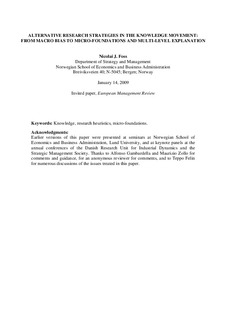| dc.contributor.author | Foss, Nicolai Juul | |
| dc.date.accessioned | 2010-05-11T13:50:24Z | |
| dc.date.available | 2010-05-11T13:50:24Z | |
| dc.date.issued | 2009-01 | |
| dc.identifier.issn | 1503-5093 | |
| dc.identifier.uri | http://hdl.handle.net/11250/164296 | |
| dc.description.abstract | The emergence over the last two decades or so of “knowledge” as an important
part of the explanatory structure of management research is an intellectual
breakthrough that is comparable in terms of its transforming impact to the
behavioral revolution of the 1960s. A veritable “knowledge movement” has
emerged that spans several fields in management. I take stock on alternative
research strategies with that movement, distinguishing between “capabilities
first”, “networks first” and “individuals first” strategies. Reasons are given why
more research attention need to be allocated to the latter strategy if the knowledge
movement is to continue making progress, but that the aim should ultimately be to
reach towards multi-level research that combines aggregate constructs with top-
down processes and bottom-up processes. | en |
| dc.language.iso | eng | en |
| dc.publisher | Norwegian School of Economics and Business Administration. Department of Strategy and Management | en |
| dc.relation.ispartofseries | Discussion paper | en |
| dc.relation.ispartofseries | 2009:1 | en |
| dc.subject | knowledge | en |
| dc.subject | research-heuristics | en |
| dc.subject | micro-foundations | en |
| dc.title | Alternative research strategies in the knowledge movement : from macro bias to micro-foundations and multi-level explanation | en |
| dc.type | Working paper | en |
| dc.subject.nsi | VDP::Samfunnsvitenskap: 200::Statsvitenskap og organisasjonsteori: 240::Offentlig og privat administrasjon: 242 | en |
